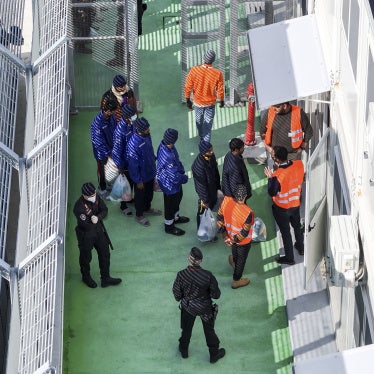European Union efforts to shift responsibility for migration to countries beyond EU borders threaten the human rights of migrants, asylum seekers and refugees, Human Rights Watch said in a briefing paper released today. On Friday, European leaders are expected to discuss migration at an EU informal summit in Lahti, Finland.
Current EU migration polices are largely focused on keeping migrants and asylum seekers outside EU borders. However, these policies have failed to ensure that the rights of migrants and asylum seekers are respected, particularly in neighboring transit countries to the east or across the Mediterranean.
“Migration poses immense challenges for EU countries, both at home and abroad,” said Holly Cartner, Europe and Central Asia director at Human Rights Watch. “But shirking responsibility for the rights of migrants and asylum seekers is not the answer.”
EU efforts to develop common policies on migration and asylum inside its borders have come under increasing criticism, including from the European Parliament. The Human Rights Watch briefing paper concentrates on the less well-known “external” dimension of the EU’s efforts, which rely on a mixture of assistance and pressure in order to shift responsibility for refugees, migrants, and asylum-seekers to transit countries, such as Ukraine or Libya, and regions of origin.
The European Union is pressing neighboring states to take on greater responsibility for migration. The case of Ukraine, detailed in the briefing paper, illustrates the ways in which many neighboring countries are already incapable of fulfilling their basic obligations, including proper access to asylum, adequate conditions of detention, and protection from return to torture or persecution. Like most other neighboring countries, Ukraine is keen on closer ties with the European Union. But EU pressure on Ukraine to detain, host, and accept the return of ever-greater numbers of migrants is not matched by an emphasis by Brussels on refugee protection and migrants rights. Greater cooperation from Ukraine may exacerbate its already poor record on migrant and refugee rights.
“If the EU wants other countries to take more responsibility for migration, it has to start by making sure they are up to the task,” said Cartner. “And it needs to set a positive example by living up to its own obligations towards migrants and asylum seekers.”
The most controversial dimension of the EU externalization agenda – processing asylum-seekers outside the EU – apparently has been shelved. But the European Union remains committed to “outsourcing” both control of migration and the determination of asylum. Current components of this approach include:
- the refusal of entry into EU territory of asylum-seekers who come from countries designated as “safe countries of origin” or transit through countries deemed to be “safe third countries”;
- the interdiction at sea of persons attempting to reach EU territory;
- the conclusion of “readmission agreements” with countries outside the European Union, by which the countries agree to accept the return from EU territory of migrants and asylum seekers who transited through their territory en route to the European Union; and
- support to border enforcement and detention capacity in neighboring transit countries.
The European Union has also proposed an approach offering development aid and humanitarian assistance to increase the ability of countries outside the EU to host refugees from the region through a European Commission-designed Regional Protection Programme. Whether such efforts genuinely improve protection capacity, or are used instead as a pretext by EU states to deny access to asylum in the EU and return those at risk to what are deemed “safe countries,” will be a fundamental test of the European Union’s commitment to its obligations toward refugees and others in need of protection.








